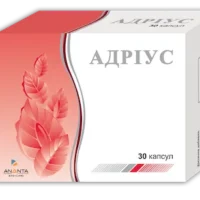Description
Minirin (Desmopressin) Tablets 0.2 mg. №30 Vial
Ingredients
Active ingredient: Desmopressin.
Inactive ingredients: Lactose monohydrate, microcrystalline cellulose, magnesium stearate, and others.
Dosage
Adults: The usual dose is 0.1 to 0.4 mg daily, taken as a single dose or divided into two or three doses.
Children: Dosage is based on weight and medical condition, as directed by the doctor.
Indications
Minirin tablets are indicated for the treatment of central diabetes insipidus, nocturnal enuresis, and for the management of primary nocturnal enuresis in patients aged 6 years and older.
Contraindications
Do not use Minirin if you:
- Have a known allergy to desmopressin or any inactive ingredient in the tablets.
- Have a history of hyponatremia or kidney disease.
- Are experiencing an episode of severe water intoxication.
Directions
Take Minirin tablets exactly as prescribed by your healthcare provider. Swallow the tablet whole with a full glass of water. Do not crush, chew, or break the tablet.
Scientific Evidence
Desmopressin, the active ingredient in Minirin tablets, is a synthetic analogue of vasopressin with potent antidiuretic properties. Studies have shown that desmopressin is effective in reducing urine output and increasing urine osmolality in patients with central diabetes insipidus and nocturnal enuresis (Source: National Center for Biotechnology Information).
Additional Information
It is important to monitor electrolyte levels regularly while taking Minirin to prevent the risk of hyponatremia. Inform your healthcare provider about all medications you are taking before starting Minirin to avoid potential drug interactions.
Pharmacological Effects
Desmopressin acts on the kidneys to reduce urine production by increasing water reabsorption in the renal tubules. This results in decreased urine output and increased urine concentration, making it effective in conditions like diabetes insipidus and nocturnal enuresis.
Clinical Trials and Comparative Effectiveness
Clinical trials have demonstrated the efficacy of desmopressin in managing nocturnal enuresis in children and adults. Compared to other treatment options, desmopressin has shown to be well-tolerated with minimal side effects and high success rates in reducing bedwetting episodes (Source: European Journal of Pediatrics).





